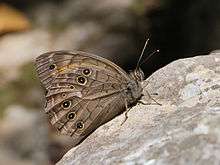Kirinia roxelana
Kirinia roxelana, the lattice brown, is a butterfly of the family Nymphalidae. It is found in southeastern Europe and the Near East. The butterfly is on wing between May and July. The larvae feed on various grasses.
| Kirinia roxelana | |
|---|---|
 | |
| Adult male, showing ventral surface of wings | |
| Scientific classification | |
| Kingdom: | Animalia |
| Phylum: | Arthropoda |
| Class: | Insecta |
| Order: | Lepidoptera |
| Family: | Nymphalidae |
| Genus: | Kirinia |
| Species: | K. roxelana |
| Binomial name | |
| Kirinia roxelana (Cramer, 1777) | |
| Synonyms[1] | |
| |
Description
The length of the forewings is 29 to 31 mm (1.1 to 1.2 in). Seitz describes it thus- P. roxelana Cr. (45 c). The largest Pararge, with the margin of the hindwing strongly dentate, especially in the female. Male black-brown. Female grey-brown, with the disc of the forewing reddish yellow. Underside of forewing fiery yellowish red with the margins grey-brown; hindwing beneath with dark dentate lines and a curved row of unequal ocelli beyond the centre. From South-East Hungary to the Black Sea, on the Balcan Peninsula, Cyprus, in Asia Minor and Mesopotamia, in the plains as well as the mountains, in June and July, not rare.[2] It can be confused with the lesser lattice brown (Kirinia climene) with which it shares part of its range.[3]
Distribution and habitat
The lattice brown is found in southeastern Europe and the Near East. Its range extends from Bulgaria and southern Croatia through the Balkans to northern Iran, Turkey and Israel, including many of the islands in the Aegean Sea. It is found in a variety of habitats such as warm, dry grassland and scrubland with rocks near woodland, forest verges, vineyards and olive groves with stone walls.[4]
Ecology
There is one generation of this butterfly which is on the wing between April and September, and is most commonly seen from May to July. The eggs are laid on broad-leaved grasses, often at the foot of walls or rocks. The caterpillars are fusiform, green with longitudinal yellowish and pale green stripes. Having overwintered as caterpillars, they pupate in the spring among the vegetation before emerging as adults.[4]
References
- "Kirinia roxelana (Cramer, 1777)". insecta.pro.
- Seitz. A. in Seitz, A. ed. Band 1: Abt. 1, Die Großschmetterlinge des palaearktischen Faunengebietes, Die palaearktischen Tagfalter, 1909, 379 Seiten, mit 89 kolorierten Tafeln (3470 Figuren)

- Rowlings, Matt. "Kirinia roxelana: lattice brown". European butterflies. Retrieved 27 July 2020.
- Wagner,Wolfgang. "Kirinia roxelana (Cramer, 1777)". European lepidoptera and their ecology. Retrieved 27 July 2020.
External links
| Wikimedia Commons has media related to Esperarge roxelana. |
| Wikispecies has information related to Kirinia roxelana |